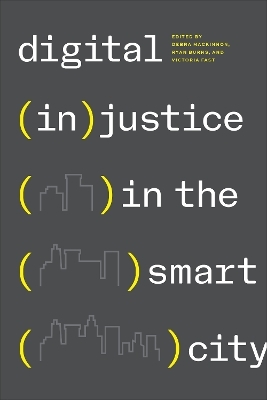
Digital (In)justice in the Smart City
University of Toronto Press (Verlag)
978-1-4875-2715-0 (ISBN)
In the contemporary moment, smart cities have become the dominant paradigm for urban planning and administration, which involves weaving the urban fabric with digital technologies. Recently, however, the promises of smart cities have been gradually supplanted by recognition of their inherent inequalities, and scholars are increasingly working to envision alternative smart cities.
Informed by these pressing challenges, Digital (In)Justice in the Smart City foregrounds discussions of how we should think of and work towards urban digital justice in the smart city. It provides a deep exploration of the sources of injustice that percolate throughout a range of sociotechnical assemblages, and it questions whether working towards more just, sustainable, liveable, and egalitarian cities requires that we look beyond the limitations of "smartness" altogether. The book grapples with how geographies impact smart city visions and roll-outs, on the one hand, and how (unjust) geographies are produced in smart pursuits, on the other. Ultimately, Digital (In)Justice in the Smart City envisions alternative cities – smart or merely digital – and outlines the sorts of roles that the commons, utopia, and the law might take on in our conceptions and realizations of better cities.
Debra Mackinnon is an assistant professor in the Interdisciplinary Studies Department at Lakehead University. Ryan Burns is an assistant professor in the Department of Geography at the University of Calgary. Victoria Fast is an associate professor in the Department of Geography at the University of Calgary.
List of Figures
Introduction: Towards Urban Digital Justice: The Smart City as an Empty Signifier
Part One: Challenging the Foundations of Smart
A Dialogue with Stephen Graham
1 Who Is Telling the Smart City Story? Feminist Diffractions of Smart Cities
2 More Queer, More than Human: Challenges for Thinking Digital Justice in the Smart City
3 Urbanists in the Smart City: Sidewalks, Sidewalk Labs and the Limits to “Complexity”
4 The Evolution of Splintering Urbanism in Planetary Information Ecosystems
5 Cybernetic Urbanism: Tracing the Development of the Responsibilized Subject and the Self-Organizing Communities in Smart Cities
Part Two: Data Decisioning and Data Justice
A Dialogue with Rob Kitchin
6 Articulating Urban Collectives with Data
7 Coding Out Justice: Digital Platforms’ Enclosure of Public Transit in Cities
8 Epistemic (In)justice in a Smart City: Proto-Smart and Post-Smart Infrastructures for Urban Data
9 The Politics of Re-membering: Inequity, Governance, and Biodegradable Data in the Smart City
Part Three: Infrastructures of Injustice
A Dialogue with Vincent Mosco
10 Good and Evil in the Autonomous City
11 Pornhub Helps: Digital Corporations in Italian Pandemic Cities
12 Trajectories of Data-Driven Urbanism and the Case of Intelligent Transport Systems
13 The Parking Problem and the Limits of Urban Digitalization
14 On the Contradictions of the (Climate) Smart City in the Context of Socio-environmental Crisis
Part Four: Complicated and Complicating Digital Divides
A Dialogue with Ayona Datta
15 Decolonizing the Smart City: Excess and Appropriation of Uber Eats in Santiago de Chile
16 Does Formalization Make a City Smarter? Towards Post-Elitist Smart Cities
17 The Smart City and COVID-19: New Digital Divides amid Hyperconnectivity
18 Beyond the Digital Divide: Libraries Enabling the Just Smart City
19 Struggling Zones, Stagnant Cities, Inner Regions: Just Renewal through Smartness in Saint John, New Brunswick?
Part Five: Urban Citizenship and Participation
A Dialogue with Alison Powell
20 The Challenges of Fostering Citizenship in the Smart City
21 Structuring More, Inclusive, and Smart Participation in Planning: Lessons from the Field
22 Emerging Inequalities in Citizen-centric Smart City Development: The Perceptible Initiatives in Taipei
23 Reimagining Smart Citizenship, Reconciling (Im)Partial Truths: POFMA, Digital Data, and Singapore’s Smart Nation
24 From Smart to Sharing Cities: The Promise of Citizen-Led, Place-Based Digitalization
Contributors
Index
| Erscheinungsdatum | 08.02.2023 |
|---|---|
| Reihe/Serie | Technoscience and Society |
| Zusatzinfo | 14 b&w illustrations, 4 b&w maps, 8 b&w figures, 1 b&w table |
| Verlagsort | Toronto |
| Sprache | englisch |
| Maße | 150 x 231 mm |
| Gewicht | 720 g |
| Themenwelt | Geschichte ► Teilgebiete der Geschichte ► Kulturgeschichte |
| Sozialwissenschaften ► Ethnologie | |
| Sozialwissenschaften ► Soziologie | |
| Technik ► Architektur | |
| ISBN-10 | 1-4875-2715-2 / 1487527152 |
| ISBN-13 | 978-1-4875-2715-0 / 9781487527150 |
| Zustand | Neuware |
| Haben Sie eine Frage zum Produkt? |
aus dem Bereich


